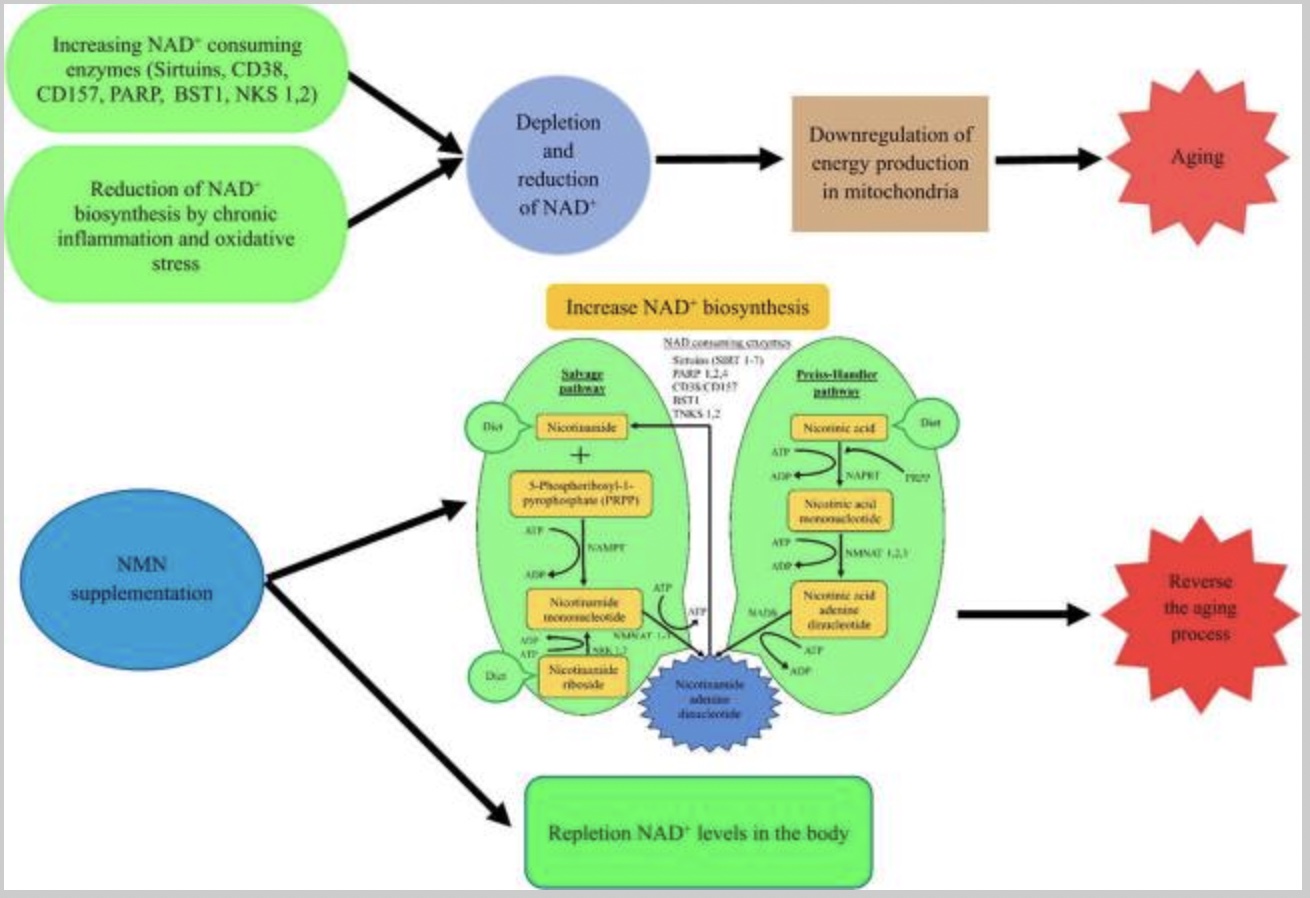Nicotinamide Mononucleotide (NMN) is a nucleotide derived from ribose and nicotinamide. It is a critical precursor of nicotinamide adenine dinucleotide (NAD+), a coenzyme essential for cellular metabolism and energy production. NAD+ is essential for life as part of several key cellular reactions, including those involved in the production of ATP, the cellular energy currency.
NAD+ levels are essential for cellular health and longevity. In addition to being necessary for the production of ATP, NAD+ is important for the function of sirtuins, a class of proteins involved in the regulation of cellular aging, stress resistance, and metabolic processes.
Recent research shows that decreased NAD+ levels may be a causative factor in high blood pressure through interactions with CD38.[ref] (I will come back to this in a future article — CD38 regulates NAD+ levels and seems to be important in a lot of things).
Some theories place the downregulation of energy production in the mitochondria at the heart of aging. Thus, preventing the negative declines of aging through mitochondrial energy should be a possibility.

I’m just going to focus on NAD+ and aging here. More to come on a few other aspects of mitochondrial health.
As we age, NAD+ levels decline, and this change is associated with age-related diseases such as heart disease, neurodegenerative disorders, and metabolic syndrome.
NMN has potential as a natural therapeutic agent to combat the age-related decline in NAD+. By increasing NAD+ levels, NMN supplementation aims to restore cellular energetics to a more youthful state.
Why do NAD+ levels decline? NAD+ levels decline with age because oxidative stress and chronic inflammation, both of which increase with age, inhibit the biosynthesis of NAD+.
Interestingly, NAD+ levels increase in response to a low-calorie diet, which may be one way that chronic calorie restriction increases lifespan in mice.[ref]
Sound too good to be true? Let’s take a look at the research studies and see the results — and important possible side effects.
An animal study in mice with type 2 diabetes found that NMN improved glucose intolerance by restoring NAD+ levels, and that NMN acted on SIRT1 as well as increasing NAD+. This improved insulin sensitivity and reduced oxidative stress in mice fed a high-fat diet (similar to a Western junk food diet).[ref] Animal studies are important in showing the direction of change and the mechanism of action, but they don’t necessarily show that an intervention will have the same effect in humans.
Insulin resistance:
A 2021 study tested NMN in overweight, prediabetic women. The results showed that NMN increased insulin sensitivity and insulin signaling.[ref]
Biological Age, Walking Speed:
A study of 80 participants showed that oral NMN (300 mg, 600 mg, or 900 mg) increased blood NAD concentrations compared to a placebo group. A six-minute walk test showed increases over placebo, with the 600 mg and 900 mg groups showing the best results. Insulin resistance didn’t change, but most of the participants were not insulin resistant to begin with. Biological age decreased with all doses of NMN.[ref]
Aerobic capacity:
A clinical trial in runners looked at NMN doses of 300, 600, or 1200 mg per day compared to a placebo. The results showed increased aerobic capacity in the 600 and 1200 mg/day trial groups. [ref]
Fatigue in older adults:
A study in older adults looked at sleep quality and physical performance. The results showed that taking NMN (250 mg) in the afternoon improved lower limb function (sit-to-stand time) and reduced afternoon drowsiness. [ref]
Improved body weight:
A study of overweight, middle-aged adults showed that 500 mg a day of NMN slightly reduced body weight, blood pressure, and cholesterol after one month. The results weren’t dramatic, but they were statistically significant without other interventions.[ref]
No effects:
Some studies show no effects, and NMN is probably not a cure-all in the elderly. For example, in a study of older men (average age 81), NMN at 250mg/day didn’t improve grip strength or walking speed compared to placebo.[ref]
Is NMN safe?
There are a lot of clinical studies that show that NMN is likely safe in the short term at doses up to 1,250 mg.[ref][ref][ref][ref]
The question that comes to my mind is whether it is safe to use long term due to possible increased cancer growth. For someone who currently has cancer, I would highly recommend talking to your oncologist before supplementing with NMN or anything that promotes cell growth.
